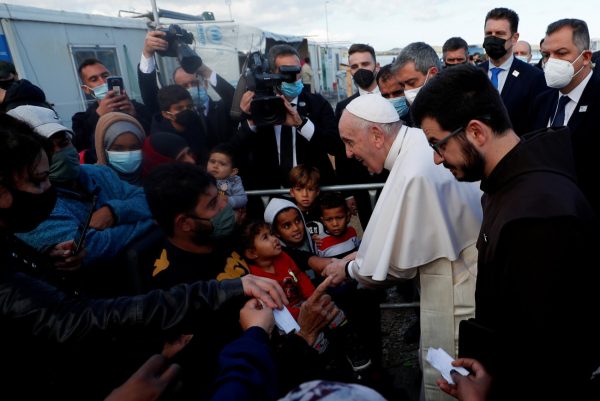
Greece is experiencing an intense weather shift as the weekend’s “express storm” unfolds, creating disruptions in various regions. The Epirus region, in particular, has faced severe impacts from the sudden spell of extreme weather.
Stormy winds have caused serious problems in areas of the cities of Arta and Preveza in the region of Epirus, with reports saying several house chimneys were destroyed and a wood factory wall collapsed late Friday evening.
Special units from the electricity distribution network HEDNO are working to restore damage caused to electric poles after trees fell on them due to the strong gusts in Preveza.
Temperatures have dropped in many regions of the country; according to the Hellenic National Meteorological Service (HNMS), strong south-westerly winds of up to 8 on the Beaufort scale are sweeping through the central and northern Aegean. The forecast says these will give way to north-westerly winds of similar force affecting both the Aegean and Ionian seas.
Meteorologists on social media predict that by Sunday, temperatures are expected to plunge by up to 10 degrees Celsius from north to south.
The general forecast from the Greek Meteorological Services says that Saturday will be cloudy with rain and thunderstorms expected in the Ionian, western, central, and northern mainland, as well as the eastern Aegean islands and western Crete. Temporary showers may also occur in other regions of the country.
By Saturday morning, weather conditions will gradually improve, starting in the west. By evening, rain will be confined to the Aegean, eastern Evia, and northern Crete, where light, localized rainfall is expected. Brief snowfalls may occur in mountainous areas of northern Greece, particularly in Western Macedonia.
Temperatures will drop initially in the northern and central regions and later in the rest of the country. The northern regions will see highs of 12°C, while the Ionian and other mainland areas will reach 16–18°C. Southern areas may experience highs of 19–20°C, while the southern islands could peak at 21°C and the Dodecanese islands at 23°C.
Source: tovima.com
Latest News

Pope Francis Died of Stroke and Heart Failure Vatican Confirms
As news of the official cause of death spread, tributes poured in from across the globe. The 1.4 billion-member Catholic Church is united in grief, remembering a pope who championed inclusion, justice, and compassion

Increase in Both Museum Visits, Revenues for 2024
As expected, the Acropolis was the top archeological site in the country, followed by Sounion, Mycenae, the ancient theater of Epidaurus, and Vergina in northern Greece

Where Greece’s Tourists Come From: A Look at 2025’s Top Visitor Markets
The United Kingdom continues to hold the top spot as the largest source of incoming tourism, with 5.6 million seats booked for Greece this summer — up 2.2% from last year. This accounts for 20% of all international air traffic to Greece

Pope Francis: A Pontiff Who Reshaped the Papacy and Sparked a Global Conversation
His first words from the balcony of St. Peter’s Basilica—“Brothers and sisters, good evening”—set the tone for a pontificate that would challenge norms, favor mercy over dogma, and bring the papacy closer to the people.

When Blue Skies was Unmasked as ND’s Political ‘Slush Fund’
The fact that so many top New Democracy (ND) party cadres were paid by the firm Blue Skies, owned by Thomas Varvitsiotis and Yiannis Olympios, without ever citing this publicly, raises very serious moral issues, regardless of the legality

Greek Women’s Water Polo Team Top in the World after 13-9 Win Over Hungary
The Greek team had previously defeated another tournament favorite, the Netherlands, to reach the final.

S&P Raises Greek Rating; BBB with Stable Outlook
S&P’s decision raises the Greek economy to the second notch of investment grade ladder, at BBB with a stable outlook.

Greek Tourism Optimistic About Demand from American Market
A recent survey by MMGY Global, conducted from April 3–5 with a sample of 1,000 U.S. adults, found that 83% of Americans still intend to take leisure trips over the next 12 months, a slight drop from 87% in late February

New Exposé by Domumento Reveals Nefarious Triangular Link of ‘Black Money’ with New Democracy, Blue Skies, & Truth Team
The latest exposé by the Documentonews.gr news site lays bare what appears to be a surreptitious path of indirect financing of ND through the business sector—transactions that, as widely understood, rarely occur without expectations of reciprocal benefit

PM Meloni Meets Vice President Vance in Rome Signalling Optimism on Ukraine Talks
Meloni emphasized the strength and strategic value of the Italy-U.S. partnership.










![Πλημμύρες: Σημειώθηκαν σε επίπεδα ρεκόρ στην Ευρώπη το 2024 [γράφημα]](https://www.ot.gr/wp-content/uploads/2025/04/FLOOD_HUNGRY-90x90.jpg)


![Ξενοδοχεία: Μεγάλο το ενδιαφέρον για επενδύσεις στην Ελλάδα – Η θέση της Αθήνας [γραφήματα]](https://www.ot.gr/wp-content/uploads/2025/03/Athens-hotels-90x90.jpg)


![Airbnb: Πτωτικά κινήθηκε η ζήτηση τον Μάρτιο – Τι δείχνουν τα στοιχεία [γράφημα]](https://www.ot.gr/wp-content/uploads/2024/07/airbnb-gba8e58468_1280-1-90x90.jpg)






















![Ξενοδοχεία: Μεγάλο το ενδιαφέρον για επενδύσεις στην Ελλάδα – Η θέση της Αθήνας [γραφήματα]](https://www.ot.gr/wp-content/uploads/2025/03/Athens-hotels-600x399.jpg)


 Αριθμός Πιστοποίησης
Αριθμός Πιστοποίησης